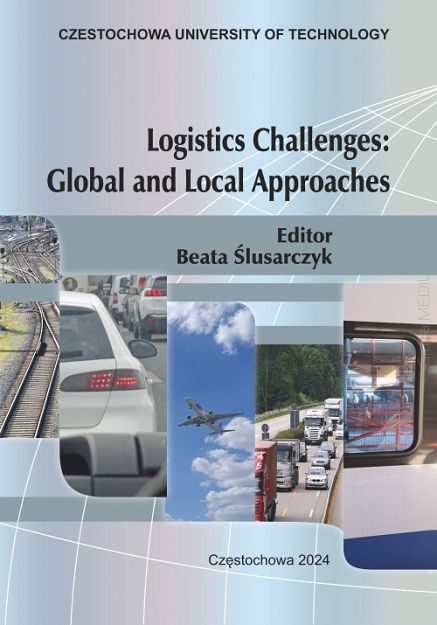Logistics Challenges: Global and Local Approaches
- Dodaj recenzję:
- Kod: 5778
- Producent: Wydawnictwo Politechniki Częstochowskiej
- Autor: red. Beata Ślusarczyk
- Rok wydania: 2024, wydanie pierwsze
- ISBN: 978-83-65976-10-9
- Liczba stron: 216
- Oprawa: miękka
- Format: B5
-
Dostępność:
Jest
-
- Cena netto: 99,05 zł 104,00 zł
- szt.
Opis
The monograph, titled Logistics Challenges: Global and Local Approaches, is the result of scientific meetings and discussions held during the Global Conference on Logistics (GCoL2024). The aim of the Global Conference on Logistics was to disseminate the latest research findings and achievements of scholars at an international forum, as well as to discuss current issues in the fields of logistics and management.
This monograph presents a multifaceted perspective on the challenges and opportunities of contemporary logistics, showcasing both scientific research and practical solutions in this field. It is divided into three parts, each focusing on different but complementary aspects of modern logistics: advanced technologies and innovations, sustainable development, and the economics of transport and logistics. The first part, Modern Technologies and Innovations in Logistics, explores the role of innovative technologies such as Artificial Intelligence (AI), the Internet of Things (IoT), and Web 4.0 technologies in enhancing the efficiency and adaptability of logistics processes. This section includes analyses of AI applications in inventory management, highlighting the benefits of neural networks and machine learning. The authors discuss the development of IT systems, such as SDP3, aimed at optimizing transport in production processes. Additionally, the significance of logistics clusters in Poland is examined, emphasizing their role as catalysts for innovation through collaboration, technology development, and integrated networks of enterprises. The chapters in this part provide invaluable insights into the role of technology in increasing logistics competitiveness and adaptability to changing market conditions.
The second part, Sustainable Development and Logistics Process Optimization, focuses on the role of logistics in achieving sustainable development goals and optimizing processes in response to environmental and economic challenges. A key topic is the decarbonization of transport, requiring significant CO2 emission reductions by 2050. The authors present decarbonization scenarios for Poland, emphasizing the need for new technologies and regulatory frameworks. They also highlight the "milkrun" concept, which enhances operational efficiency by integrating supply and return processes. An important aspect of this part is the analysis of CSR practices in the logistics sector, covering sustainable development objectives in environmental, social, and governance areas. Practical examples and studies underscore the necessity of an integrated logistics approach that combines innovation with environmental responsibility.
The third part, Transport and Logistics Economics, addresses economic and strategic aspects of logistics and transport. One of the discussed topics is the formation of freight rates in the face of rising operational costs, such as fuel prices and road tolls. These analyses rely on the Total Cost of Ownership (TCO) methodology, indicating cost optimization directions for transport companies. Another key issue is the impact of autonomous vehicles on supply chains in Europe, considering economic savings and increased efficiency. The authors also examine the significance of information exchange standards, such as EDI, GS1, and XML, in market forecasting and operational risk reduction. These standards enable faster data exchange, improved transparency, and better disruption management in supply chains. The final chapters in this section focus on integrating technological innovations with renewable energy sources in construction, highlighting logistics' potential contributions to sustainable practices.
The monograph Logistics Challenges: Global and Local Approaches serves as a valuable resource for researchers, practitioners, and students interested in contemporary logistics challenges.
Spis treści
Introduction
Part I. Modern Technologies and Innovations in Logistics
Chapter 1. AI Support in Inventory Management: A Case Study on New Possibilities
Péter Veres
Chapter 2. The SDP3 System as a Tool Determining the Efficiencyof Transportation in the Production Process
Nicoletta Baskiewicz, Michał Ciuk
Chapter 3. Innovation in Logistics Clusters in Poland
Anna Horzela-Miś, Jakub Semrau
Chapter 4. Trends in Green Innovation Research Development
Anuphat Thirakulwanich
Chapter 5. The Symbiosis of Web 2.0, Web 4.0 Technologiesand Supply Chain Management: Insights fromBibliographic Analysis and Topic Modeling
Gabrielė Radavičiūtė
Part II. Sustainable Development and Logistics Process Optimization
Chapter 6. CSR Concept in Management of LogisticsEnterprises – Analysis of Implementationof Sustainable Development Goals
Julia Wieczorek, Marta Kadłubek
Chapter 7. Advancing Sustainable Development: Transport Decarbonization Pathways to Carbon Neutrality in Poland
Oksana Seroka-Stolka
Chapter 8. Optimisation of Milkrun-based Material Supply through Process Integration
Tamás Bányai
Chapter 9. Evaluation of Reverse Logistics in the Supply hain of Bottling Companies: A Case Studyof Junac and La Sien Water Bottling Company
Anna Budzik, Gift Oriaku Eke Agwu
Part III. Transport and Logistics Economics
Chapter 10. Urban Road Transport in a Large City:Identification of Key Challenges
Marta Daroń
Chapter 11. Factors Shaping Freight Rates in Road Transport
Katarzyna Grondys, Aleksandra Placek
Chapter 12. Investigating the State of Autonomous Vehicleson Supply Chain: a Literature Review
Negar Sohaee, Sara Sohaee Urbina,Navidreza Ahadi, Farnaz Azadjoutabari
Chapter 13. Logistics Market Forecasting and Analysis: Using Information Standards to Reduce Risk
Katarzyna Sukiennik, Tomasz Szczepanik
Chapter 14. Integration of Technological Innovations with Renewable Energy Sources in the Construction Industry
Jakub Semrau, Anna Horzela-Miś
Informacje o bezpieczeństwie produktu Informacje o producencie
Zadaj pytanie dotyczące produktu. Nasz zespół z przyjemnością udzieli szczegółowej odpowiedzi na zapytanie.

